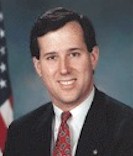
Santorum
Sen. Santorum Introduces Filtering Bill
(August 15, 1999) Sen. Rick Santorum introduced a bill pertaining to the use of filtering software by schools and libraries receiving e-rate subsidies. It would allow schools and libraries far more discretion than the bills sponsored by Sen. John McCain and Rep. Bob Franks.
| Related Pages |
| Summary of Filtering Bills in the 106th Congress. |
| S 1545 IS, 8/5/99. |
Sen. Rick Santorum (R-PA) introduced S 1545 IS, the Neighborhood Children's Internet Protect Act, on August 5, 1999. It was one of many bills filed just before the House and Senate broke for the August recess.
At the beginning of the 106th Congress, Sen. John McCain (R-AZ) and Rep. Bob Franks (R-NJ) introduced bills that would require schools and libraries that receive universal service support under Section 254 of the Telecom Act of 1996 to use filtering software. This program subsidizes schools for costs associated with telecommunications services, Internet service, and internal connections. It is sometimes referred to by its supporters as the "e-rate". Its opponents sometimes call it the "Gore Tax."
| Related Story: Rep. Istook Introduces Filtering Bill for Federally Funded School Computers, 7/25/99. |
On July 20, Rep. Ernest Istook (R-OK) introduced his own bill. It would require all schools and libraries receiving federal funds to acquire or operate computers to use a filtering technology to protect children from Internet porn.
The McCain bill, S 97 RS, was approved by the Senate Commerce Committee on June 23, 1999. The Franks bill was amended and attached to the House juvenile justice bill on June 14. The juvenile justice bill passed the House in June 17. The Senate passed a different bill, and the matter is in conference.
The Santorum bill, S 1545 IS, is a much watered down alternative to the filtering bills offered by McCain, Franks, and Istook. It is a filtering bill to the extent that it allows schools and libraries to use filtering software.
 |
|
| Sen. Rick Santorum |
It would require schools and libraries receiving e-rate subsidies to either install filtering software or implement a policy regarding minor's access to the Internet. The bill is far less stringent than those introduced by McCain, Franks and Istook. First, it offers schools and libraries the option of implementing a policy, rather than actually using filtering software. This policy, hypothetically, could be unrestricted access by minors. Second, if a school selects the option of using filtering software, the requirement is merely that it be installed. There is no requirement that it be operational or in use.
The bill provides that in order to be eligible to receive universal service support under Section 254 of the Telecom Act schools and libraries must certify that they either have filtering software or an Internet use policy. If filtering software option selected, then the school or library must have:"(i) selected a system for its computers with Internet access that are dedicated to student use in order to filter or block Internet access to matter considered to be inappropriate for minors; and (ii) installed on such computers, or upon obtaining such computers will install on such computers, a system to filter or block Internet access to such matter;"
If implementing a policy is the option selected, then it must "address" the following:
"(I) access by minors to inappropriate matter on the Internet and World Wide Web;
(II) the safety and security of minors when using electronic mail, chat rooms, and other forms of direct electronic communications;
(III) unauthorized access, including so-called `hacking', and other unlawful activities by minors online;
(IV) unauthorized disclosure, use, and dissemination of personal identification information regarding minors; and
(V) whether the school or library, as the case may be, is employing hardware, software, or other technological means to limit, monitor, or otherwise control or guide Internet access by minors"
| Related Stories |
| McCain and Hollings Reintroduce
School Filtering Bill, 1/22/99. Internet Filtering Supporters Back Franks-McCain, 3/3/99. NTIA Opposes Mandatory Filtering Under E-Rate, 4/13/99. House Adopts Franks' Internet Filtering Bill, 6/18/99. Senate Commerce Committee Passes E-Rate Filtering Bill, 6/24/99. Istook Introduces Filtering Bill for Federally Funded School Computers, 7/25/99. |